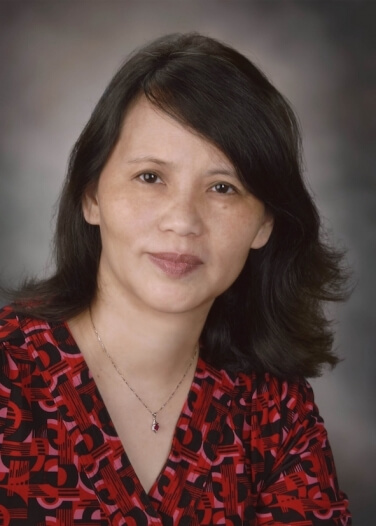By Steven Lee
A research team at The University of Texas Health Science Center at San Antonio, also known as UT Health San Antonio, seeks to prevent Hispanic childhood obesity with the help of a five-year, $1 million grant from Baptist Health Foundation of San Antonio.

The potentially groundbreaking research led by principal investigator Lily Q. Dong, PhD, professor of cell systems and anatomy at UT Health San Antonio, is testing whether there is a genetic marker of early insulin resistance in youth that could be controlled, thereby preventing obesity and development of Type 2 diabetes. Currently, most studies and treatment focus on adults, and pediatric anti-obesity drugs have limited effect.
The need is particularly urgent for Hispanic children, 27% of whom are obese in Bexar County, where more than 65% of adults overall are overweight and obese.
Generous support
The donation marks the largest-ever research grant by Baptist Health Foundation of San Antonio and builds upon its longtime support of UT Health San Antonio – including a transformational gift to advance the establishment of the university’s Glenn Biggs Institute for Alzheimer’s and Neurodegenerative Disease; scholarships for nursing, medical and health professional students; and ongoing support of community outreach to those in greatest need. Since 2006, the foundation has provided more than $8 million to UT Health San Antonio.
“Baptist Health Foundation has been an invaluable community partner for so many outstanding efforts here and across the community,” said William L. Henrich, MD, MACP, president of UT Health San Antonio. “This gift will provide hope to some of the most vulnerable children in our community, and we are deeply grateful for this important investment to focus on pediatric diabetes. Dr. Dong and her team are committed to the shared mission of improving health in our community, and we are especially grateful to the trustees for their interest in this important area where the need is so great.”
Partnership in place
Dr. Dong is collaborating with co-investigator Jane L. Lynch, MD, FAAP, professor of pediatrics, both with the Joe R. and Teresa Lozano Long School of Medicine at UT Health San Antonio, and with Ravindranath Duggirala, PhD, professor of human genetics at the South Texas Diabetes and Obesity Institute, part of The University of Texas Rio Grande Valley (UTRGV) School of Medicine.
Already, with the help of UTRGV, the team has collected 670 blood samples for the study from South Texas Hispanic children ages 6-17. Of those, 53% are considered overweight, 34% are obese, 13% are pre-diabetic and 19% have metabolic syndrome. All are conditions that raise the risk of diabetes or heart disease.
Making a difference
“We’re honored to fund a collaboration allowing Dr. Dong to move forward on this important research for children,” said Cody Knowlton, President and CEO of Baptist Health Foundation of San Antonio. “We look forward to the study results and the impact they will have for so many children who are at risk for diabetes. This study will make a difference in a critical area of health, and is an exciting prospect for our Christ-centered foundation, which is focused on improving health while honoring our God and our Baptist heritage.”
Obesity’s undesirable effects
Obesity can cause resistance to insulin, which regulates blood sugar levels. When that happens, more insulin is secreted by the pancreas to maintain normal glucose levels. Continued high levels of insulin in the blood can also cause more fat to accumulate. This adds stress on pancreatic cells that can lead to dysfunction and Type 2 diabetes.
The researchers have identified a small protein called Leucine-rich alpha2-glycoprotein, or Lrg1, that is at higher levels in the blood of obese adults. They also know that blood levels of Lrg1 are higher in young obese mice than in lean ones.
Eye toward prevention
Dr. Dong’s team will measure whether those levels also are increased in obese Hispanic children, and if Lrg1 is a genetic marker of early insulin resistance. Ultimately, the researchers will test whether obesity and high insulin secretion could be prevented by reducing or even removing Lrg1.
“Obesity is one of the most serious health problems of children in this region, and it is the mission of our work to find an answer,” Dr. Dong said. “This research is only possible because of people like the Baptist Health Foundation trustees, who share our mission to make a difference for children and families facing the serious challenge of pediatric diabetes.”
The University of Texas Health Science Center at San Antonio, also referred to as UT Health San Antonio, is one of the country’s leading health sciences universities and is designated as a Hispanic-Serving Institution by the U.S. Department of Education. With missions of teaching, research, patient care and community engagement, its schools of medicine, nursing, dentistry, health professions and graduate biomedical sciences have graduated more than 37,000 alumni who are leading change, advancing their fields, and renewing hope for patients and their families throughout South Texas and the world. To learn about the many ways “We make lives better®,” visit www.uthscsa.edu.
Stay connected with The University of Texas Health Science Center at San Antonio on Facebook, Twitter, LinkedIn, Instagram and YouTube.
To see how we are battling COVID-19, read inspiring stories on Impact.


